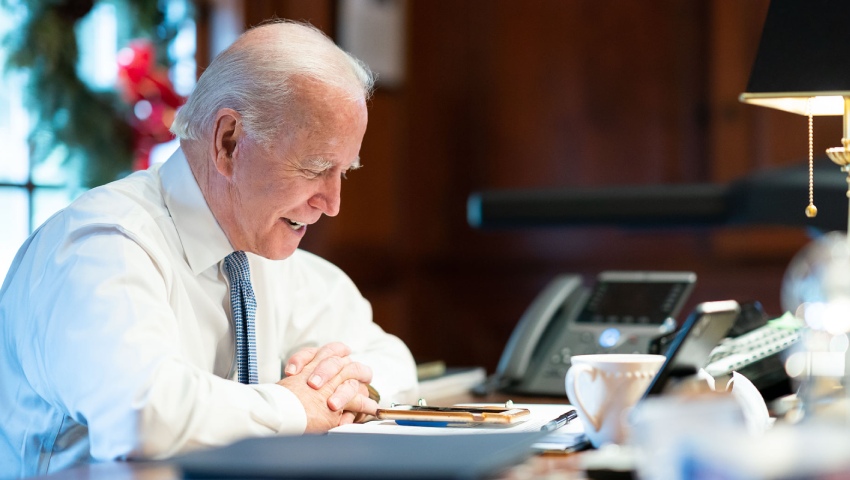Should US President Joe Biden place less of an emphasis on China’s ideological agenda to gather support among Indo-Pacific nations?
To continue reading the rest of this article, please log in.
Create free account to get unlimited news articles and more!
The ‘no limits’ relationship between Beijing and Moscow has been portrayed by the West as an authoritarian pairing, which seeks to undermine the global rules-based order and challenge long-held liberal-democratic norms.
This ideological struggle has been trumpeted by US President Joe Biden and his Western allies to gather international support and form a coalition against the increasingly coercive Chinese and Russian regimes.
Russia’s invasion of Ukraine has only reinforced this division, validating the West’s concerns over a rise in authoritarian aggression.
But according to Dr Peter Lee, research fellow, foreign policy and defence program at the United States Studies Centre, the US should “de-emphasise” this ideology-based strategy when seeking to form an Indo-Pacific coalition against China.
Dr Lee says that while appealing to European allies threatened by Russia, such rhetoric fails to resonate among Indo-Pacific nations unwilling to sever all ties with Beijing.
“The hardening US-China ideological schism misreads the region’s underlying insecurities,” he writes.
He claims that to effectively compete with China for influence in the Indo-Pacific, the US should better illustrate the long-term relationship it seeks with China.
“Framing US-China relations primarily as an ideological contest, rather than over relative power and coercive behaviour, will make the competition more zero-sum and harder to build an effective coalition with politically diverse regional powers,” Lee adds.
Breaking down Biden’s ideology-based strategy
The research fellow notes President Biden’s efforts to emphasise US power over China by promoting its economic strength and global leadership.
“This led the administration to maintain the trade war with China in defence of ‘fair trade’ and to continue dealing with China bilaterally rather than seeking arbitration through the World Trade Organization,” he observes.
The administration has also sought to strengthen ties with Europe to counter China in global forums.
Dr Lee claims these strategies were employed in response to a conception of China’s challenge as “non-democratic” and subversive of existing rules and institutions.
On the military front, Dr Lee points to the Pentagon’s description of China as the top ‘pacing challenge’, suggesting its military modernisation would be the benchmark for US military planning.
“[The US] wants to counter some of China’s technological developments such as testing a hypersonic missile and improving its nuclear arsenal by strengthening its own deterrent capability in these domains,” Dr Lee writes.
He also references the ramp up in military aid to Taiwan amid People’s Liberation Army Air Force flights into Taiwan’s Air Defence Identification Zone.
“At the same time, the administration wants to avoid military conflict and aims to co-operate with Beijing where possible,” Dr Lee continues.
“Throughout the year, the Biden administration sought to ensure ‘some common-sense guardrails’ with China and identify areas for potential co-operation, including climate change, energy supplies, Iran, North Korea, Afghanistan, and ‘strategic stability’ issues of nuclear arsenals.”
Dr Lee also makes reference to US Secretary of State Anthony Blinken’s call for China to support the international condemnation of Russian’s invasion of Ukraine.
A change of tack
Dr Lee goes on to propose an alternative strategy in the Indo-Pacific, stressing that the US should link its competition with China to Beijing’s coercive actions and not its authoritarian political system.
“It is China’s coercive actions that generate Asian insecurities and require stronger deterrence more than its authoritarian nature,” he writes.
“Many of the region’s small and middle powers are instead trying to find a modus vivendi with China that accommodates its economic rise, including membership in regional trade blocs, while strengthening their ability to defend their interests against its coercive practices.
“A US China policy that only focuses on the latter will be necessary but insufficient. Justifying that policy with appeal to ideology is likely to fall on deaf ears.”
Dr Lee points to the reluctance of most Asian countries to join the diplomatic boycott of the Beijing Winter Olympics on human rights grounds, claiming this suggests Washington would “struggle to win support based on political values in a region as diverse as the Indo-Pacific”.
He adds it would also complicate US relations with strategically important non-democratic states like Vietnam.
“The rhetorical shift towards ideological binaries may help galvanise support in Europe but may prove less effective in many Asian capitals,” he concludes.
Get involved with the discussion and let us know your thoughts on Australia’s future role and position in the Indo-Pacific region and what you would like to see from Australia's political leaders in terms of partisan and bipartisan agenda setting in the comments section below, or get in touch with

 Login
Login







